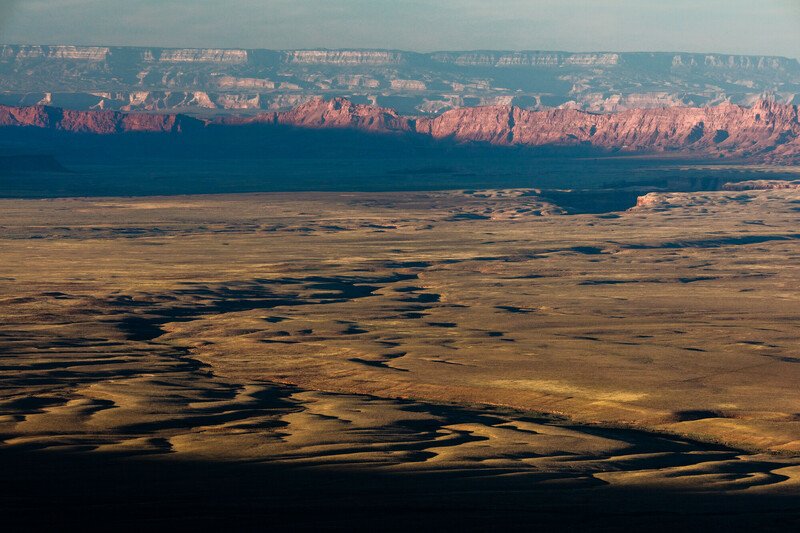For Immediate Release, February 5, 2025
|
Contact: |
Taylor McKinnon, Center for Biological Diversity, (801) 300-2414, [email protected] |
Trump’s Interior Order Threatens to Open Grand Canyon National Monument to New Uranium Mining
GRAND CANYON NATIONAL PARK, Ariz.— Tribes, conservation organizations and community groups today defended Baaj Nwaavjo I’tah Kukveni – Ancestral Footprints of the Grand Canyon National Monument, which could be at risk under Interior Secretary Doug Burgum’s Monday order to review national monuments and mineral withdrawals.
The monument safeguards nearly 1 million acres surrounding the iconic Grand Canyon National Park from new uranium mining claims. It enjoys widespread bipartisan public support in Arizona and backing from Tribes, businesses, governments, elected officials and conservation groups. The monument harbors sacred sites, like Red Butte, and its diverse ecology includes federally protected animals like California condors and species of plants and animals found nowhere else on Earth.
Designated by President Biden in 2023, Baaj Nwaavjo I’tah Kukveni was originally proposed by the Grand Canyon Tribal Coalition, which includes 14 Tribal nations. Its designation followed a 2012 mineral withdrawal safeguarding the region and Grand Canyon’s aquifers and springs from new uranium mining.
Baaj Nwaavjo means “where tribes roam” for the Havasupai Tribe, and I’tah Kukveni means “our ancestral footprints” in Hopi.
The groups issued the following statements:
“We stand with the Tribes who proposed this monument and the vast majority of Arizonans who support it against these reckless attacks,” said Taylor McKinnon, Southwest director at the Center for Biological Diversity. “These iconic cultural landscapes and their remarkable biodiversity deserve protection from more water-polluting uranium mining. We’ll do everything we can to keep these protections in place.”
“We have and continue to support the Indigenous people who have been stewards of and advocated for protection of the Baaj Nwaavjo I’tah Kukveni – Ancestral Footprints of the Grand Canyon as a national monument that will be co-managed by Tribal nations,” said Sandy Bahr, director of Sierra Club’s Grand Canyon Chapter. “This action by the Trump administration could put at risk the waters, cultural resources, and wildlife of the region, plus the economy of northern Arizona. We must strongly and vociferously say no to including these precious lands in the order.”
“As people of faith, we are called to be stewards of creation, honoring and protecting the sacred lands and waters that sustain life. The Baaj Nwaavjo I’tah Kukveni – Ancestral Footprints of the Grand Canyon National Monument holds deep spiritual and cultural significance, particularly for Indigenous communities who have stewarded this land for generations,” said Rev. Katie Sexton, executive director of the Arizona Faith Network. “Any effort to weaken its protections threatens not only the environment but also our moral responsibility to care for God’s creation. Arizona Faith Network stands in solidarity with Tribal nations and all who seek to safeguard this irreplaceable landscape for future generations.”
“Today Baaj Nwaavjo I’tah Kukveni – Ancestral Footprints of the Grand Canyon National Monument protects the essential lands, waters, wildlife and cultural heritage of Grand Canyon’s rimlands, but only after many decades of advocacy by Tribes, along with a broad community of support in Arizona and all across America, which includes Wild Arizona,” said Kelly Burke, co-executive director of Wild Arizona. “Any action to diminish or remove this protection opens the door to large scale industrial development with associated irreversible harm to springs, streams and precious aquifers, indigenous cultures, the outdoor recreation economy, and wildlife habitat and corridors of the Grand Canyon region. Arizona deserves better from this administration.”
“Protecting wild landscapes like Baaj Nwaavjo I’tah Kukveni – Ancestral Footprints of the Grand Canyon National Monument is essential to the health of our planet and society," said Danny Giovale, founder and owner of Kahtoola. “They provide clean water, food, and cultural and recreational value, and their sustainable management is vital for future generations. Kahtoola stands in solidarity with the Tribes and the vast majority of Arizonans who support this designation.”
“Decades in the making with strong Tribal leadership and overwhelming public support, Baaj Nwaavjo I’tah Kukveni preserves a vast cultural and natural landscape. Protecting this monument is critical, and weakening its safeguards to prioritize energy leasing could threaten the greater Grand Canyon landscape,” said Sanober Mirza, Arizona program manager for the National Parks Conservation Association. “For over a century, the Antiquities Act has served as the bedrock for conserving our nation’s iconic landmarks, including the Grand Canyon itself. If we lose these places to oil and gas drilling or mining, there's no going back.”
“We live in a country of brilliant minds, capable of making us a world leader in energy innovation, yet Burgum and the Trump administration seem to think the only way to achieve what they call 'energy dominance' is to abuse and desecrate our lands and waters,” said Dana Orozco, federal organizer for Chispa Arizona. “Our national monuments belong to the people — not corporations. In Arizona, 91% of voters support protecting public lands. Now is the time to stand as Earth Protectors alongside our Indigenous relatives, who have long led the fight for the designation of Baaj Nwaavjo I’tah Kukveni – Ancestral Footprints of the Grand Canyon National Monument. We must defend our lands, waters and wildlife from corporate greed. A cleaner future is possible — we can innovate without destroying the planet.”

The Center for Biological Diversity is a national, nonprofit conservation organization with more than 1.7 million members and online activists dedicated to the protection of endangered species and wild places.

